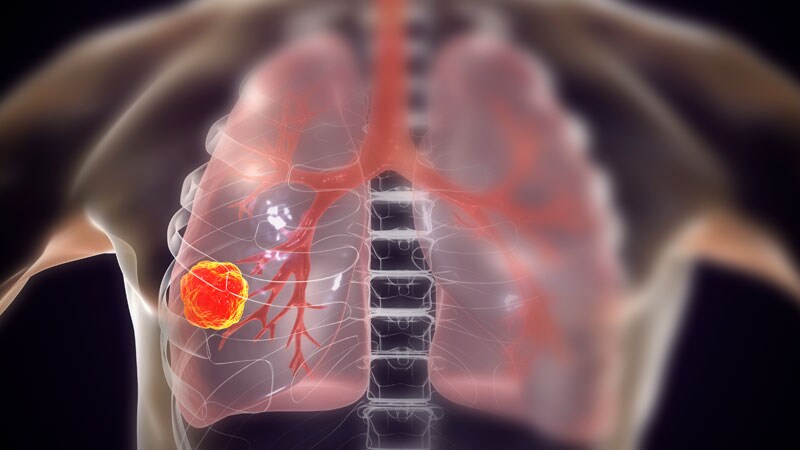Once-daily dosing of poziotinib shows clinically meaningful efficacy for patients with treatment-naive non–small cell lung cancer (NSCLC) HER2 exon 20 mutations, according to results of the ZENITH20 trial presented at the 2021 European Society for Medical Oncology Congress. Tumor reductions, stated lead author Robin Cornelissen, PhD, MD, Erasmus University, Rotterdam, the Netherlands, were seen in 88% of patients.
EGFR and HER2 exon 20 insertion mutations are rare subsets accounting for about 10% each of all mutations and 2%-4% each in NSCLC. “There is no approved therapy for either treatment-naive or previously treated NSCLC with HER2 exon 20 mutations,” Cornelissen said in a virtual oral presentation (abstract LBA46) on Sept. 18. While chemotherapy agents with or without checkpoint inhibitors and tyrosine kinase inhibitors (TKIs) are currently utilized, none are specific to exon 20 mutations, and historical response rates from mostly small uncontrolled studies vary widely from about 6.9%-35%, with median progression-free survival (PFS) ranging from 3 to 7 months. Poziotinib is a potent oral pan-HER TKI with activity in patients with EGFR or HER2 exon 20–mutated NSCLC.
Cornelissen presented preliminary safety and efficacy data from the phase 2 ZENITH20, a seven-cohort global clinical trial, specifically from cohort 4 (daily dosing) which included 48 HER2 exon 20 insertion NSCLC patients (median age, 60.5 years; female/male, 26/22) treated first-line with oral daily poziotinib (16 mg). The majority were White (75%), female (54%), and nonsmokers (69%) with an Eastern Cooperative Oncology Group performance status of 1 (65%). The primary endpoint was objective response rate evaluated centrally by an independent image review committee using RECIST 1.1 criteria.
All patients have experienced treatment-related adverse events (TRAEs) with 10% considered serious, and permanent discontinuation in 13%. About 83% of patients had dose interruptions and 76% had dose reductions. The most common adverse events were diarrhea (any grade, 83%; grade 3, 15%), rash (any grade, 69%; grade 3, 35%), stomatitis/mucosal inflammation (any grade, 81%; grade 3, 21%), and paronychia (any grade, 46%; grade 3 8%). Pneumonitis occurred in two patients (4%), with one grade 3 (2%). No grade 4/5 TRAEs were reported.
Discontinuations in 44 patients (92%), Cornelissen said, are attributed to death (5/10%), disease progression (30/63%), adverse events (1/2%), and other (8/17%), with treatment ongoing in 4 patients (8%).
The rate for the primary endpoint of ORR was 43.8% (n = 21) (95% confidence interval, 29.5%-58.8%). Tumor reductions have been observed in 42/48 patients (88%) with a median reduction of 35%. One complete response was reported (2.1%), with partial responses in 20 (41.7%), stable disease in 15 (31.3%), progressive disease in 7 (14.6%), and 5 (10.4%) not evaluable. The disease control rate was 75.0%.
Among secondary endpoints, median duration of response (DoR) was 5.4 months (range, 2.8 to >19.1), with 42% of patients having response duration greater than6 months and 24% greater than 12 months. Median PFS was 5.6 months (range, 0 to >20.2), with progression-free survival duration greater than6 months in 42% and duration greater than12 months in 26%.
Cornelissen concluded: “Poziotinib shows clinically meaningful efficacy for treatment-naive NSCLC HER2 exon 20 mutations with [daily] dosing.” The toxicity profile, he added, is manageable and in line with previous poziotinib studies and other second-generation EGFR TKIs.
Noting that improved tolerability and antitumor activity have been observed in the cohort 5 (8 mg b.i.d.) interim analysis, Cornelissen said that cohort 4 is ongoing with patients enrolling at 8-mg b.i.d. dosing.
HER2 mutations represent 1.7%-2.2% of NSCLC, with high-sequence homology with EGFR mutation, observed ESMO-appointed discussant Daniel S.W. Tan, PhD, National Cancer Center in Singapore. He pointed out that, while HER2 antibody drug conjugates and TKIs have gained approval in other cancer types (e.g., breast, gastric), currently no HER2 therapies are approved in NSCLC. Reviewing ZENITH20 findings (risk ratio, 43.8%; DoR, 5.4 months; PFS, 5.6 months), Tan stated that poziotinib is an active agent in HER2 mutated NSCLC. “One concern that remains for me is the safety profile that will require further evaluation in order to determine optimal dosing,” he said.
Potential combinations, he added, need to be explored to improve the durability of response. “Until we can properly characterize this and other important aspects such as CNS activity, we need to be cautious about transitioning to a frontline setting. Also, we do need to give due consideration to strategies to improve HER2 testing rates in order to expand on clinical experience. This argues for the importance of broad upfront next generation sequencing testing in NSCLC.”
The study was funded by Spectrum Pharmaceuticals. Other authors associated with the research disclosed full or part-time employment with Spectrum.
This article originally appeared on MDedge.com, part of the Medscape Professional Network.

